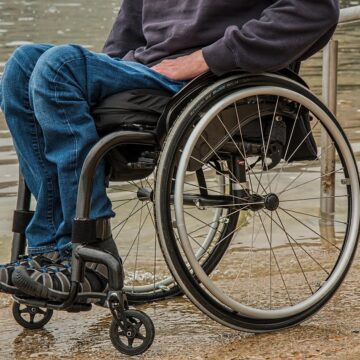
-
- Muscle wasting or atrophy is usually caused by lack of physical activity for an extended period of time.
- Its symptoms are often accompanied by other symptoms caused by varying disorders.
- Due to prolonged disuse of muscles, progressive muscle weakness and permanent disability may result.
Muscle atrophy refers to the loss of muscle tissue that can be caused by a prolonged lack of mobility, aging, malnutrition, medications, or a host of diseases or injuries that affect the musculoskeletal or nervous system. Without regular movement, muscles waste away over time, leading to muscle weakness and disability.
What are the symptoms common to muscle atrophy?
Muscle atrophy may come with other symptoms that vary depending on certain underlying conditions. Symptoms will depend on the type of neuromuscular disorder and the areas of the body that are affected.
There are several neuromuscular disorders that may occur along with muscle atrophy. Common symptoms include:
- Balance problems
- Trouble speaking and swallowing
- Facial weakness
- Gradual memory loss
- Tingling, numbing or weakness in arms or legs
- Movement issues
- Loss of muscle coordination
- Progressive loss of movement
- Multiple sclerosis symptoms including weakness, numbness or tingling, vision problems, unsteady walk, fatigue, and depression
Other symptoms that may occur along with muscle atrophy associated with other conditions such as fatigue, stiffness for over an hour upon waking up in the morning, frequent episodes of falling and inflammation of an injury.
In some cases, muscle atrophy can pose sudden and life-threatening symptoms. When this happens, seek medical help or call 911 immediately. Such serious symptoms include:
- Passing out or unresponsiveness
- Garbled or slurred speech
- Paralysis of a body part
- Sudden loss of vision or eye pain
- Sudden weakness of numbness on one side of the body
- Excruciating headaches
What causes muscle atrophy?

One type of muscle atrophy is disuse atrophy or lack of muscle movement and use which happens because of various situations or conditions that include:
-
- Aging
- Being bedridden due to a medical condition
- Dermatomyositis, a condition characterized by muscle weakness and skin rash
- Injuries such as broken bones, burns
- Malnutrition leading to progressive weakening and inability to use muscles
- Muscular dystrophy, which refers to a genetic disorder marked by a progressive loss of muscle tissue and muscle weakness
- Osteoarthritis which causes pain and immobility
- Polymyositis or a widespread inflammation and weakness of muscles
- Rheumatoid arthritis, a chronic autoimmune disease characterized by joint inflammation
- Another type of muscle atrophy is neurogenic atrophy, a condition caused by an injury or disease that harms the nerves attached to the muscle. The muscle becomes damaged from conditions including:
- Alcohol myopathy
- Amyotrophic lateral sclerosis (ALS) also known as Lou Gehrig’s disease
- Diabetic neuropathy or damaged nerves resulting from high blood sugar levels Toxin exposure
- Multiple sclerosis
- Spinal cord atrophy, an inherited disease marked by impaired muscle function from a neural defect
In some cases, there are serious or life-threatening causes of muscle atrophy that require immediate attention. Among these include stroke, Guillain-Barre syndrome which is an autoimmune nerve disorder, neck or spinal cord injury and stroke.
Potential Complications of Muscle Atrophy

Muscle atrophy is a serious disease, which when left untreated, can progress to permanent damage. Once the underlying cause is determined, it is crucial for you to follow your treatment plan to lower the likelihood of developing future serious complications that such as:
- Decreased athletic performance
- Decreased mobility
- Disability
- Loss of strength
- Paralysis or inability to move a body part
How is muscle atrophy diagnosed?

To diagnose your condition, your doctor will need your complete medical history. In relation to your muscle atrophy, you will be likely be asked the following questions:
- Do you have any other symptoms?
- Have you been receiving medical treatment for any other health conditions?
- What medications are you taking?
- When did you first notice muscle atrophy?
- Which of your muscles are affected?
To help with the diagnosis, your doctor may require tests to rule out certain diseases. These may include blood tests, X-rays, MRI or CT scans, nerve conduction studies and electromyography (EMG). You may be referred to a specialist depending on your test results.
Source: Health Grades
